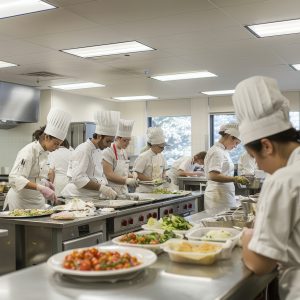I’m Going To Culinary School – Should I Live On Campus?
Living on campus at culinary school offers an immersive experience that blends culinary training with community living. For aspiring chefs, it’s more than just honing their skills in the kitchen—it’s about embracing a lifestyle that fosters creativity, collaboration, and personal growth.
Students are surrounded by like-minded peers, all driven by the same passion for food and culinary excellence. This unique environment provides countless opportunities to connect with others, share ideas, and build lifelong friendships.
Living on campus also means convenient access to state-of-the-art kitchens, classrooms, and resources, making balancing a busy schedule of classes, labs, and extracurricular activities easier. The proximity to learning spaces allows students to fully engage in their culinary education without the distractions of a daily commute.
Additionally, many culinary schools offer on-campus dining options that cater to students’ diverse tastes, often featuring dishes prepared by fellow students as part of their training.
Beyond the kitchen, campus life includes social events, study groups, and cultural activities, contributing to a well-rounded experience. Living on campus at culinary school is an opportunity to immerse oneself in a vibrant, food-focused community where culinary skills and personal connections can flourish.
Benefits of Living On Campus
Here are the key benefits of living on campus at culinary school:
- Convenience: Easy access to kitchens, classrooms, and study resources without the hassle of commuting.
- Immersive Environment: Surrounded by a community of like-minded peers, fostering creativity and collaboration.
- Networking: Opportunities to build lasting relationships with fellow students, instructors, and culinary professionals.
- Enhanced Learning: More time to focus on culinary training and practice, with fewer distractions from outside responsibilities.
- Campus Amenities: Access to on-campus dining options, study spaces, fitness centers, and other student services.
- Time Management: Better ability to manage a busy schedule of classes, labs, and extracurricular activities due to proximity.
- Cultural and Social Activities: Involvement in campus events, student organizations, and cultural activities that enrich the overall experience.
- Supportive Community: A built-in support system of students and staff, offering help and encouragement during challenging times.
- Personal Growth: Development of independence, time management skills, and adaptability through communal living.
- Safety and Security: On-campus housing often includes enhanced safety measures and round-the-clock security.
What If There Is No Campus Housing?
Students must explore alternative living arrangements if a culinary school doesn’t offer on-campus housing. Here are some considerations and potential options for students in this situation:
Off-Campus Housing Options:
- Apartments: Renting an apartment close to the school provides convenience and independence. Students can choose shared or private living arrangements based on their budget.
- Shared Housing: Many students opt to share a house or apartment with fellow students, splitting rent and utilities, which can be more affordable than living alone.
- Homestay Programs: Some schools or local organizations may offer homestay programs where students live with a local family and gain cultural experiences while focusing on their studies.
- Student Housing Complexes: Some cities have housing complexes specifically designed for students from various institutions. These complexes offer amenities like study rooms, gym facilities, and communal spaces.
Considerations for Living Off-Campus:
- Commute: Students must consider travel time and transportation costs when choosing a location. Proximity to public transit or owning a car can impact daily schedules.
- Budget: Renting off-campus requires budgeting for rent, utilities, groceries, and other living expenses.
- Community: Although off-campus living offers independence, students might miss out on the community-building aspect of on-campus living. However, staying engaged with school events and student groups can help foster connections.
Though living off-campus requires additional planning, it can still provide students with valuable life experiences and flexibility during their culinary education.
















2 Responses
I was wondering if you could answer some question for me for a school research for me.
Hi Natalie, I can try. Please contact me through my email form on my website.